
Global Report
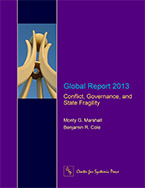
The annual Global Report series analyzes global system performance and fragility in the Globalization Era. The Report series monitors the key trends in armed conflict, governance and societal-system development and provides the State Fragility Index and Matrix. The analysis highlights a nearly 24% reduction in state fragility at the global level since 1995 and also discusses regional trends. It includes maps showing the global distribution of armed conflicts, regimes and state fragility and examines the relationship between state fragility, democratization and system complexity in the context of regional systemic cascades in the global system during the emerging Era of Globalization.
Please click on the cover icon here to go to the CSP Global Report Series page.
Please click the cover icons on the left, below, to access a PDF copy of the publication listed.
Peace and Conflict
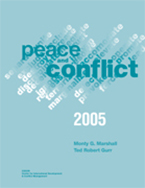
Peace and Conflict 2005: A Global Survey of Armed Conflicts, Self-Determination Movements and Democracy
Monty G. Marshall and Ted Robert Gurr - Full Color, 92 Pages, 15 figures, 12 tables
Publisher: CIDCM, University of Maryland, 2005
Peace and Conflict 2005 is the third edition in the Integrated Network for Societal Conflict Research (INSCR) Program's biennial global report series. This report details major trends in armed conflict, self-determination movements and democracy through the contemporary era, 1946-2004. It provides a "conflict ledger" assessing each country's "peace-building capacity" in 2005. The 2005 report also incorporates new features on the decline of political discrimination, instability in Africa, assessing risks of genocide and politicide and the societal-systemic roots of global terrorism.
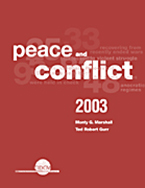
Peace and Conflict 2003: A Global Survey of Armed Conflicts, Self-Determination Movements and Democracy
Monty G. Marshall and Ted Robert Gurr - Full Color, 64 pages, 11 figures, 8 tables
Publisher: CIDCM, University of Maryland, 2003
Peace and Conflict 2003 is the second edition in the Integrated Network for Societal Conflict Research (INSCR) Program's biennial global report series. This report details major trends in armed conflict, self-determination movements and democracy through the contemporary era, 1946-2002, and provides a "conflict ledger" assessing each country's "peace-building capacity" in 2003. The 2003 edition of the report complements the 2001 edition by updating the trends and issues raised in the earlier report, expanding its analysis of global and regional trends in democratization, extending its analysis of self-determination movements to examine group grievances and strategies and updating its descriptions of the status of major armed conflicts and self-determination movements. The 2003 report also incorporates new features on anti-globalization protest and international crises.
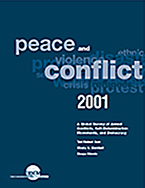
Peace and Conflict 2001: A Global Survey of Armed Conflicts, Self-Determination Movements and Democracy
Ted Robert Gurr, Monty G. Marshall and Deepa Khosla - Full Color, 32 pages, 7 figures, 5 tables
Publisher: CIDCM, University of Maryland, 2001
Peace and Conflict 2001 is the first publication from the Integrated Network for Societal Conflict Research (INSCR) program. This "global report card" details major trends in armed conflict, self-determination movements and democracy through the contemporary era, 1946-2000. It provides a "conflict ledger" assessing each country's "peace-building" capacity at the turn of the new millennium. It features global and regional analysis of trends in armed conflict and comprehensive surveys of the status of armed conflicts since 1995 and self-determination movements since 1946.
Other CSP Studies
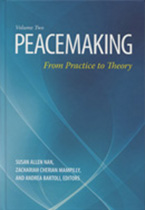
Chapter 41. Systemic Peacemaking in the Era of Globalization
Monty G. Marshall
B/W, 17 pages including notes
Publisher: Peacemaking: From Practice to Theory, Volume 2
Susan Allen Nan, Zachariah Cherian Mampilly, and Andrea Bartoli, eds.
Santa Barbara, CA: Praeger (ABC-CLIO Inc), 2012
Peacemaking: From Practice to Theory (a two volume set) is about seeing, knowing, and learning peacemaking as it exists in the real world. Built on the premise that peacemaking is among the most elemental of human experiences, this seminal work emphasizes the importance of practice and lived experiences in understanding the process and learning what works to nurture peace. "The irony of war representing a pathway to peace is an extreme application of the peace paradox, in which the act of war defines the nature of peace. If peace is to have any real meaning, it must be a distinct condition independent of war. Peaceful relations can be neither created under nor enforced by the threat of war. The notion that peacemaking should, and can, have an applied meaning as a pathway to establishing an empirical peace on Earth must be, then, seen as the peace conundrum. The first step in practical peacemaking, which is the political process by which we attempt to solve the peace conundrum, begins with the question: How can we recast our notion of peace so that peace defines the problem of war?" (Marshall, p. 651)
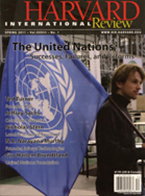
Spotlight: The New Democratic Order: Complex Societal-Systems and the "Invisible Hand"
Monty G. Marshall - B/W, 12 pages, 6 figures, 4 photos
Publisher: Harvard International Review, 33.1 (Spring 2011): 95-106.
This invited Harvard International Review "Spotlight" article summarizes the societal-systems perspective that forms the theoretical foundation of the Center for Systemic Peace. "With the advent of the industrial revolution, human history entered a period of acceleration characterized by our rapidly expanding ability to 'do' tending to outpace our ability to understand, and hence, to effectively manage our efforts and our effects. What we generally refer to as globalization is a complex, dynamic process by which new technologies of doing, understanding and managing converge and cover the structured landscape of our planet Earth. In other words, globalization involves changes in the qualities of development, conflict and governance in a global societal-system."
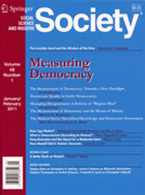
Symposium: Measurement of Democracy
The Measurement of Democracy and the Means of History
Monty G. Marshall - B/W, 12 pages
Publisher: Social Science and Modern Society, 48.1 (January/February 2011): 24-35.
This invited article for Social Science and Modern Society appeared as part of a symposium on "measuring democracy" that includes articles by Stein Ringen, Arend Lijphart, Andrew Sabl and Nico Stehr and Jason L. Mast. "The focus of measurement in the social sciences is on identifying common metrics and accurately capturing the essential quality of key factors and attributes that define complex social phenomena. Objective and subjective assessments must be separated to the degree possible. Similarly, in social processes, means and ends must be distinguished in order to gauge performance. Governance and social order are, to a greater degree than any other social phenomena, based in commonalities of collective action and response. These constitute the means of history and should be distinguished from the ends so we can better understand how the past got us to the present and what we might make of the future."
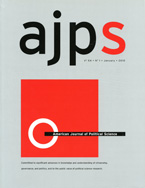
A Global Model for Forecasting Political Instability
Jack A. Goldstone, Robert H. Bates, David L. Epstein, Ted Robert Gurr,
Michael B. Lustik, Monty G. Marshall, Jay Ulfelder, and Mark Woodward
B/W, 19 pages, 3 figures, 3 tables, 2 appendices
Publisher: American Journal of Political Science 54.1 (January 2010), 190-208
Examining onsets of political instability in countries worldwide from 1955-2003, we develop a model that distinguishes countries that experienced instability from those that remained stable with a two-year lead time and over 80% accuracy. Intriguingly, the model uses few variables and a simple specification. The model is accurate in forecasting the onsets of both violent civil wars and nonviolent democratic reversals, suggesting common factors in both types of change. Whereas regime type is typically measured using linear or binary indicators of democracy/autocracy derived from the 21-point Polity scale, the model uses a nonlinear five-category measure of regime type based on the POlity components. This new measure of regime type emerges as the most powerful predictor of instability onsets, leading us to conclude that political institutions, properly specified, and not econmic conditions, demography, or geography, are the most important predictors of the onset of political instability.
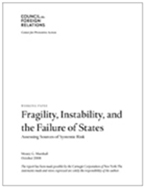
Fragility, Instability and the Failure of States: Assessing Sources of Systemic Risk
Monty G. Marshall - B/W, 26 pages, 1 figure, 1 table
Publisher: Center for Preventative Action, Council on Foreign Relations, 2008
This Council on Foreign Relations, Center for Preventative Action Working Paper surveys and evaluates existing approaches to assessing state fragility and failure within the context of development, conflict and governance. It examines the risk factors that have been identified through systemic inquiry and research with the goal of improving the prospects for successful conflict prevention and management, and argues that the goal of "early warning" relating to state fragility, instability and failure should be more to form and temper our expectations for effective policy response than to trigger costly and risky interventions. Includes a table listing 102 indicators used in quantitative, systemic risk assessment and early warning models and organized into five categories: security, political, trade, economic and social-demographic indicators.
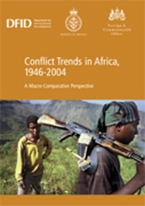
Conflict Trends in Africa, 1946-2004: A Macro-Comparative Perspective
Monty G. Marshall - Full color, 78 pages, 20 figures, 10 statistical annexes, executive summary
Publisher: Africa Conflict Prevention Pool, DfID (UK), 2006
Conflict Trends in Africa was commissioned by the Africa Conflict Prevention Pool (ACPP) of the Government of the United Kingdom and contracted by the Department for International Development (DfID). Sub-Saharan Africa is an extremely weak and volatile regional sub-system in the globalizing world system. Pervasive and persistent violence has confunded efforts to improve eoonomic capacity and performance in the region. Eight macro-comparative perspectives on conflict trends in Africa are charted in order to establish a fairly comprehensive picture and understanding of the background of the situation in the region in mid-2005. Regional variations in three principal conflict trends are then presented for the Central, East, West and Southern regions of Africa. The report uses macro-comparative statistical modeling to identify key explanatory factors in state formation and post-formation instability in African states and general peace-building capacity. The report concludes with discussions of three models that help to explain the conditions that undermine stability and limit the capacity of African states to better manage societal conflicts.
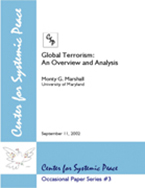
Global Terrorism: An Overview and Analysis
Monty G. Marshall - Black and white, 48 pages, 5 figures, 7 tables, 3 statistical appendices
Publisher: Center for Systemic Peace, Occasional Paper 3, 20
Global Terrorism was commissioned by the United Nations Department of Economic and Socal Affairs (UNDESA) shortly after the September 11, 2001, attacks on the United States to "undertake a broad evidence based overview and detailed analysis of the ways in which terrorism presents a fundamental threat to societies and the global social order in order to help guide the SIB/DSPD in refining its peace-building/social integration strategy, including collaboration with the UN Terrorism Branch (UNDCCP) in addressing the social roots of terrorism." For the purposes of this study, two operationalized conceptions of "terrorism" were designed, measured, and analyzed. Both measures, "excessive targeting of civilian populations in armed conflicts" and "tactical terrorism," focus on the global problem of terrorism in the decade preceding the 9/11 attacks: the 1990s.
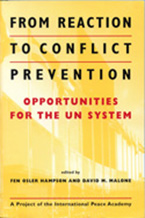
Chapter 4: Measuring the Societal Impact of War
Monty G. Marshall - Black and white, 42 pages, 4 figures, 1 table, 2 appendices, with notes
Publisher: From Reaction to Conflict Prevention: Opportunities for the UN System
Fen Osler Hampson and David M. Malone, eds.
Boulder, CO: Lynne Rienner, 2002 (International Peace Academy)
Measuring the Societal Impact of War was included in a compendium of studies organized for the UN by the International Peace Academy and looking at changes in the nature of warfare in the Post-Cold War world. "War is perhaps the most distinctive, dramatic, documented, and studied phenomenon in the social sciences, yet it remains one of the most problematic concepts to quantify and compare, rivaling the concept of the "state" in its capacity to confound analysis. In order to better understand the problem of warfare from a systemic perspective, so that systemic conflict management and prevention strategies may be better designed, implemented, and evaluated, it is necessary to develop measures of the societal and systemic impact of warfare that can better inform analyses of social conflict and political violence at the global level. The conventional analysis of warfare that evolved during the era of state-centric internationalism unduly prioritizes state sovereignty, military strategy, and international anarchy in its preoccupation with issues of national security. These priorities are clearly inadequate for defining security in the emerging era of globalization." (Marshall, p. 63)
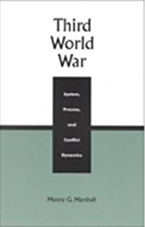
Third World War: System, Process and Conflict Dynamics
Monty G. Marshall - Black and white, 303 pages, 68 figures, 15 tables, index
Publisher: Rowman & Littlefield Publishers, 1999
Third World War contains a systems analysis of violent conflict within the dynamic context of societal-systems development and the diffusion of insecurity through complex societal networks. The "third world war" is the most recent of the global systemic wars of the twentieth century that have characterized the deconstruction and transformation of the Euro-centric "colonial" global system in the age of complex technological systems, mass communication, and open information. The "Third Word war" plagues the newly independent states of the Third World as they struggle to establish modern, central authority and guide their societies, distorted by years, decades, and, even, centuries of foreign domination, through the enormous challenges and pressures of the Cold War and Globalization Eras. The wars in the Third World are largely domestic conflicts fought primarily by amatuers. The book theorizes a syndrome of pervasive insecurity and arrested development; it documents and explains the spatial patterns of protracted political violence in the aftermath of the Second World War; a period of steadily increasing magnitudes of violence, state failures, and humanitarian crises leading to the end of the Cold War and the beginning of the Globalization Era.
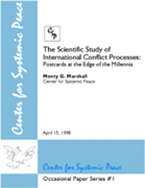
The Scientific Study of International Conflict Processes: Postcards at the Edge of the Millennia
Monty G. Marshall - Black and white, 81 pages, 6 figures, 1 table
Publisher: Center for Systemic Peace, Occasional Paper 1, 1998
The Scientific Study of International Conflict Processes was originally commissioned by the National Science Foundation in May 1997 through contract #B22456A-00-0; its general content is outlined in that contract's Statement of Work. The National Science Foundation is not responsible for the views stated herein. The purpose of this study is to chart progression and examine the current "state of the art" as regards the scientific study of international conflict processes. A special purpose of this study is to consider the contributions made toward the advancement of the science of international conflict processes through funding allocated by the National Science Foundation (NSF), an agency of the United States Government.
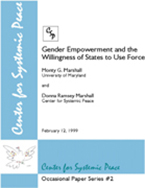
Gender Empowerment and the Willingness of States to Use Force
Monty G. Marshall and Donna Ramsey Marshall - Black and white, 46 pages, 1 figures, 5 tables, 2 appendices
Publisher: Center for Systemic Peace, Occasional Paper 2, 1999
Gender Empowerment and the Willingness of States to Use Force examines a nexus between feminist theory, which argues that "gender" is an important explanatory variable in the willingness of states (and other political actors) to use force in conflict interactions and democratic peace theory, which claims that "democracy" is important in explaining the willingness to use force. Following the lead of those who claim that it is the "entrenchment" of democratic values, rather than the democratic form of government, that lessens the predilection of states to use force in political relations, the authors propose that the quality of democratic entrenchment can be measured by the degree of "gender empowerment." Using data on 88 countries in a series of best fit regression analyses, the study finds strong support for the feminist proposition as complementary to the democratic peace understandings of the resort to force in foreign policy.
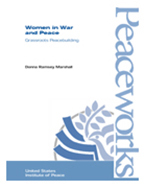
Women in War and Peace: Grassroots Peacebuilding
Donna Ramsey Marshall - Black and white, 30 pages
Publisher: United States Institute of Peace, 2000
Women in War and Peace was commissioned by the United States Institute of Peace. The United States Institute of Peace strives, through research, education, and training, to understand the role of nongovernmental entities in bringing about a stable peace in conflict-torn societies. Toward that end, on September 14, 1999, the Institute's Research and Studies Program convened a seminar entitled "Perspectives on Grassroots Peacebuilding: The Roles of Women in War and Peace," which drew together more than sixty representatives of the policy community, academia, and nongovernmental organizations. This report draws on presentations and comments made at the seminar and specifically examines the role of women in addressing the issues of conflict resolution and peacebuilding.
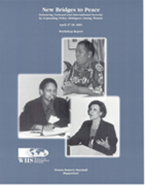
New Bridges to Peace: Enhancing National and International Security by Expanding Policy Dialogues Among Women
Donna Ramsey Marshall, raporteur - Black and white, 57 pages
Publisher: Women in International Security (WIIS), 2001
New Bridges to Peace reports on a 2001 workshop organized by Women in International Security (WIIS). Drawing together forty-five representatives of grassroots movements, nongovernmental organizations, academia, and the foreign policy community, WIIS envisioned the workshop as a way to bridge the gap between women activists and organizers working for peace "on the ground" and women working on peace and security issues at the national and international levels. The workshop was organized around the proposal that the international community must now move beyond simply recognizing women's contributions to peace and security and actively foster dialogue and collaboration among women toiling at all levels of societies. For while women are often among the hardest-hit victims of modern intrastate conflict, they are also often the most active agents of change, agitating for peace, reconciliation, and reconstruction in divided communities.
426 Center St. N, Vienna, VA 22180 USA | 202.236.9298 | © CSP 2014